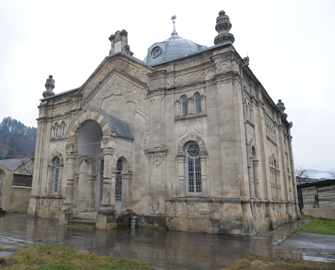Natia Gogolashvili
“In 1950 officers of the State Security Ministry found the Synagogue door locked from inside when they arrived in Oni. However, they heard children’s cry from the synagogue and understood that a lot of children were inside. Locals were gathered in the street and told the guests that Jewish and Georgian mothers together with their children locked inside the synagogue to protect it from closing. Such a bravery of the Georgian and Jewish women saved the Synagogue from deconstruction,” it is one of the heroic stories associated with Jewish and Georgian people, who protected the synagogue in Oni.
Today the Oni Synagogue is still closed. The only watchman of the synagogue Shalva Chachashvili rarely opens the locked door when pilgrims or visitors arrive there.
“In the past, before the [Jewish] people started migration from Oni, the synagogue was functioning. 3 500 Jewish persons lived in Oni then. The migration started from 1972 and lasted till 1992,” Shalva Chachashvili said. He lives in the balcony house in the yard of the Synagogue. His everyday job is to clean and look after the synagogue.
Jewish people can pray if at least ten Jewish men come together. Nowadays, they cannot collect enough people to start rituals in the synagogue, for that reason it is mostly closed. Currently, less than 20 Jewish persons live in Oni.
“The problem is unemployment. Nobody wishes to come back from Israel. Before the Soviet Union collapsed people periodically migrated from Georgia. While they lived here, religious holidays were usually celebrated. It is pleasant to recall the past. We had rituals three times a day. People used to come to the synagogue and pray. After rituals stopped, we have never had good periods,” local resident Abram Shimshilashvili said.
Chairman of the Georgian Jewish Union Merab Chanchalashvili said the main problem of the Jewish community in Georgia is high migration. He thinks it is important that the building functioned. “It will be said if it turns into a museum. It is better if the synagogue functioned and people prayed there.”
Shalva Khakhiashvili was born in Oni. He moved from Georgia 15 years ago but periodically arrives in Oni. “Israel is my historical homeland. I always wanted to go there after I identified myself as a Jewish. If we speak generally, everybody wants to keep links with Georgia but not everybody can do that. Grandchildren of many Jewish families, who may not know where Georgia is located, know Georgian language very well. As for moving to Georgia forever, it will not happen because Jewish people do not want it. During centuries we urged the God to give us opportunity to return to the homeland. Everybody loves Georgia but nobody wants to stay here forever.”
Shalva Khakhiashvili said the Jewish people will not return to Georgia to take care of the synagogues because according to their religion it is not obligatory place for them to pray. “In our religion we do not give particular significance to the location. We mostly respect torahs and holly books. They are the most important. It is important to pray but it is not important where we pray; the main issue is that we prayed in the clean environment. Nobody has right to restrict his life because of chapel. It may turn into paganism. We trust in the God and not in the chapel,” Shalva Khakhiashvili said.
It is noteworthy that Synagogue is not holly place and does not replace the holly temple which was destroyed in Jerusalem long time ago. The synagogue was first created in the Palestine (IV B.C). After the temple was destroyed in Jerusalem (70 A.D) and Jewish Diaspora wide-spread in the world, synagogues opened everywhere where Jewish people lived. They pray, read and comment on the Bible and Talmud, conduct ritual dinners in synagogues.
The synagogues which were constructed in Georgia before XIX no longer exist. Majority of existing synagogues were constructed from mid XIX century to the first decade of the XX century.
The synagogue in Oni was constructed in 1891 and in 1895 its opening ceremony was organized. The building was constructed in eclectic style and it is the third in size after the Tbilisi and Kutaisi synagogues. The synagogue is constructed with white limestone; it has dome. The building has quadrangle shape and there is multi-angle David Star on the top of the dome. The building is facing the east.
Oni Synagogue does not have status of culture heritage. At the end of the 20th century, on April 29, 1991, the temple was significantly damaged by heavy earthquake. It was restored in the same year. According to the project approved by the Monument Protection Agency, the synagogue was completely restored in 2014.
Rehabilitation works of the synagogue were implemented by the Ltd Kamara from 2012 to 2014. The work was funded by the Fund for Preservation of Cultural Heritage of Georgia.
In 2012 it was planned to eradicate the damages caused by the earthquake, namely: anti-seismological belts were installed in the walls; damaged façade stones were restored; partly paralyzed roof was replaced. In 2013 second phase of works were implemented – painting works in the interior were restored. The fence was also repaired in 2013. In 2014 the paintings in the synagogue were restored (candlesticks and composition of Mount Sinai) and one-storied building in the north-eastern corner of the yard was completely reconstructed.
On October 2, 2015 120 jubilee of the Oni Synagogue was celebrated.
The article was prepared in the frame of the project implemented with financial support of the Government of Canada. This article does not necessarily reflect the views of the donor. Human Rights Center bears sole responsibility for the content of the article.
News
December 13, 2023
Ethnic minorities outside the peace dialogue
November 6, 2023
‘Peace’ agenda of political parties
Popular
Articles
February 13, 2024




